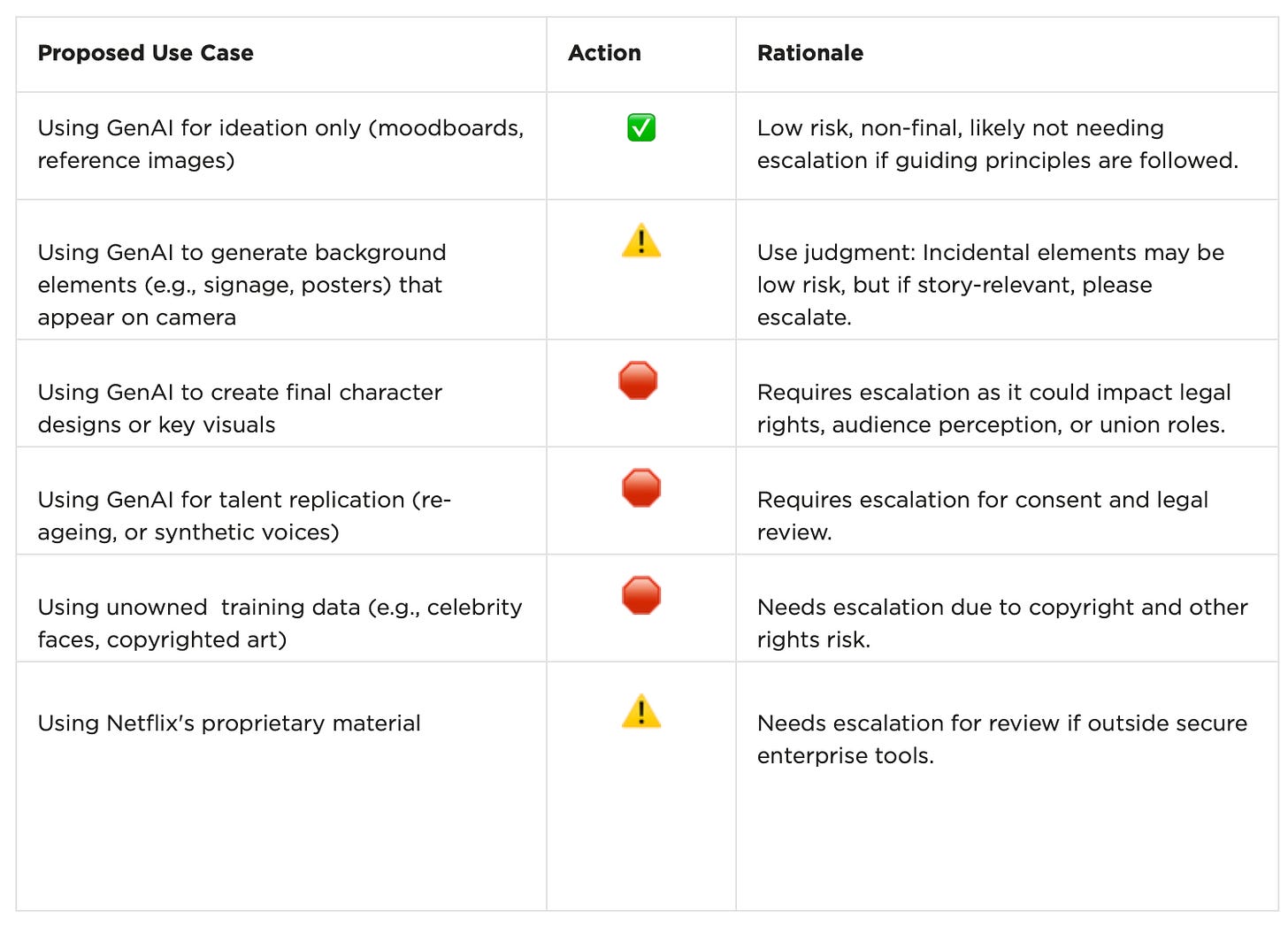Not All Generative AI Storytellers Can License To Netflix—Here's Why
Netflix requires "meaningful human input" from filmmakers, production partners, and vendors . Creators who automate heavily will be blocked from Netflix and pushed to YouTube/Patreon by default.
[Author’s Note: I will be in LA November 16th thru 19th. It would be great to connect with readers! A bunch of you have reached out already. I’d love to (re)connect with more of you. Please respond to this email if you would like to meet and are free on either Monday the 17th or Tuesday the 18th.]
An interesting question popped up in the LinkedIn discussion for Monday’s essay: Does a storyteller working with Generative AI create intellectual property which they can own? For example, Josh Kerrigan aka “Neural Viz” produces videos and sells merchandise, does he own that IP even though he uses nine or ten different AI tools to produce that content?
According to the Library of Congress, answers from courts and the U.S. Copyright Office are nuanced. A new set of Generative AI Production Guidelines from Netflix help to explain why this matters for creators looking to license in the marketplace.
A Question of Human Authorship
The key question for generative AI content is what constitutes “human” authorship. The Copyright Office wrote in 2023 that it is “well-established that copyright can protect only material that is the product of human creativity.” Also, both the Office and the courts have determined the term ‘‘author”—used in both the Constitution and the Copyright Act—“excludes non-humans”.
When authors use AI in the creative process, “what matters is the extent to which the human had creative control over the work’s expression and “actually formed” the traditional elements of authorship”. A work is not the product of human authorship “when an AI technology determines the expressive elements of its output.”
There are generally two cases where the Copyright Office will find that works containing AI-generated material may be copyrighted under limited circumstances—specifically,”sufficiently creative” human arrangements or modifications of AI-generated material or works that combine AI-generated and human-authored material.
In these cases, copyright will only protect the human-authored aspects of the work, which are ‘‘independent of’’ and do ‘‘not affect’’ the copyright status of the AI-generated material itself.
Netflix’s Guidelines
Last month Netflix released guidelines for its partners on how to use generative AI for content production. It outlined five principles for all use cases:
“The outputs do not replicate or substantially recreate identifiable characteristics of unowned or copyrighted material, or infringe any copyright-protected works
The generative tools used do not store, reuse, or train on production data inputs or outputs.
Where possible, generative tools are used in an enterprise-secured environment to safeguard inputs.
Generated material is temporary and not part of the final deliverables.
GenAI is not used to replace or generate new talent performances or union-covered work.”
“Most low-risk use cases” that follow these principles are “unlikely to require legal review”. However, those outputs that include final deliverables, talent likeness, personal data or third-party IP require written approval from Netflix before a partner can proceed. These principles also apply to any partner vendor using a custom GenAI workflow — defined as “a pipeline built from multiple tools or models”.
Netflix created the chart below for its partners to make the principles easier to follow:
Netflix & Human Authorship
Netflix’s guidelines reveal an important constraint on the distribution strategies explored in Monday’s essay. AI creators face a choice between Netflix licensing and volume strategies across open platforms—but the licensing path will not be available to all generative AI storytellers.
Netflix requires “meaningful human input” and human authorship to ensure copyright protection and avoid infringement litigation. Creators who rely heavily on AI for “expressive elements”—letting AI determine character design, shot composition, narrative structure—may not meet Netflix’s requirements even if their storytelling is excellent.
If their workflow uses AI extensively, it may not satisfy Netflix’s human authorship requirements. Licensing becomes less viable. YouTube, Patreon, and global platforms monitor copyright but as we previously learned with AI-generated movie trailers, these platforms monetize content regardless of its legal status.
The irony: Netflix’s guidelines, designed to protect the company from litigation, may push generative AI creators toward the very volume strategies that compete with Netflix. Creators who are unable to license to Netflix will have little choice but to pursue algorithm gaming and multi-platform distribution.
Monday’s question—licensing vs. volume strategies—is not just about economics. Netflix is now telling some creators that it will not be a choice at all.


